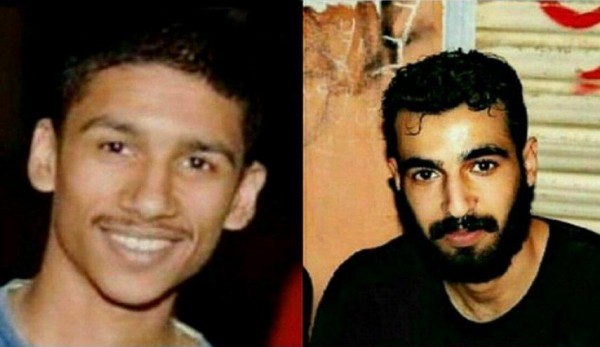7 May 2019 – Yesterday, Bahrain’s Court of Cassation rejected the final appeal of Ali AlArab and Ahmed AlMalali, two men sentenced to death in a mass trial for allegedly committing terrorist crimes. Their cases are extremely concerning, as their charges include killing a security force officer from a prominent Sunni family, which therefore increases the likelihood that the executions will take place.
AlArabi and AlMalali have now exhausted all legal remedies and are at imminent risk of execution, pending ratification by the king of Bahrain. With this decision, there are now eight men on death row and at imminent risk of execution.
Both AlArab and AlMalali were arrested separately on 9 February 2017. Despite being brought to the court from prison, both men were prevented from attending proceedings and were sentenced to death in absentia in a mass trial alongside 58 others on 31 January 2018. In addition, both men were stripped of their citizenship, but later had them reinstated by order of the King of Bahrain in a move where 551 individuals had their citizenship reinstated.
Concerningly, on 28 April 2019, a Twitter account connected with the Bahraini security forces tweeted that the Court of Cassation would uphold their death sentences and send them directly to the king for ratification. At that time, the legal representatives of AlArab and AlMalali had not been informed of the Cassation court date.
This mirrors a similar incident relating to the unlawful execution of three men in 2017, as this same account tweeted on 14 January 2017 – one day prior to the execution – that the King had ratified their sentences and that the executions will take place.
Americans for Democracy & Human Rights in Bahrain (ADHRB), the Bahrain Institute for Rights and Democracy (BIRD), and the European Centre for Democracy and Human Rights (ECDHR) condemn the decision. We also urge the king to reject AlArab and AlMalali’s sentences and for the authorities to order their immediate retrial under international standards, and an investigation into allegations of torture to hold perpetrators accountable.
Sayed Ahmed Alwadaei, Director of Advocacy at BIRD, said: “It is very saddening that the families of the condemned have received such news on the first day of Ramadan. The apparently premeditated nature of the sentences demands this case be taken with the utmost seriousness, particularly given the appalling torture these men were subjected to by security forces before their conviction in unfair trials. Now that the executions are imminent, it is critical that the international community step up and take action before it’s too late.”
Commenting, Husain Abdulla, Executive Director of ADHRB, said: “The Court of Cassation’s decision is a travesty, as both Ali and Ahmed were convicted and sentenced based on confessions they gave under torture. With this decision, they join six others on death row, all of whom were also sentenced under fundamentally unfair conditions and after torture by security forces. The international community must take action and show Bahrain that its systematic use of torture and unfair trials which are contrary to international standards, are unacceptable.”
UN Documentation of Torture Allegations
Ali AlArab (UA BHR 7/2017)
AlArab, 25, was arrested by Ministry of Interior (MoI) security agents on 9 February 2017 at the home of an acquaintance, without presenting a warrant. He was charged with allegedly assisting in the 1 January 2017 escape from Jau Prison and with killing a security officer on 29 January 2017. They held him at the Criminal Investigations Directorate (CID) until 7 March.
During this time, officials coerced him into signing a confession while blindfolded. The UN expressed “grave concern” for the allegations of torture Alarab faced during his interrogation at the Criminal Investigation Directorate, including electric shocks, the removal of toenails, severe beatings.
On 7 March 2017, AlArab was transferred to Dry Dock detention centre. Upon arrival, he was taken to the administration office of the prison and was ordered to kiss the boot of an officer. Having refused to do so, Mr AlArab was repeatedly beaten on his legs. Later that day, he was taken to the prison clinic in a wheelchair.
In their response to the UN documentation of AlArab’s case, Bahrain reaffirmed its positions and refused to accept any of the allegations presented.
Ahmed AlMalali (UA BHR 6/2018)
AlMalali, 24, was arrested by the MoI’s Coast Guard, in a joint operation with the CID, the Special Security Force Command, and the National Security Agency. According to UN documentation, AlMalali was struck by at least two bullets in his hand – which broke his bones- and broke his leg during his arrest. These bullets were not removed until 4 March 2017, after 23 days. He was charged with possessing arms, training in the use of arms, and membership in a terror cell and with killing a security officer on 29 January 2017.
After his arrest, he was held incommunicado for a month, at which time officers tortured AlMalali. He eventually confessed under coercion, the contents of which were not known to him.
The UN had stated that they were “extremely concerned” by allegations of torture in cases involving the death penalty, especially those where coerced confessions form the basis of convictions, as in the cases ofMr AlArab and Mr AlMalali.




